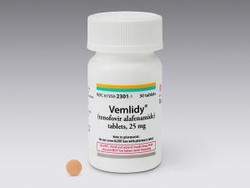Gilead Science Korea said its hepatitis B treatment Vemlidy (Ingredient: tenofovir alafenamide) started receiving expanded health insurance coverage for treating patients with decompensated cirrhosis and hepatitis B with hepatocellular carcinoma on Sunday.

The government expanded the reimbursement standard following the change in the detailed recognition standards for medical care benefits for oral chronic hepatitis B treatment.
While the standards included a phrase that “tenofovir alafenamide oral drug is not recognized for decompensated cirrhosis or hepatocellular carcinoma” during initial treatment, the government has deleted the phrase in the revision.
As a result, patients with chronic hepatitis B accompanied by decompensated cirrhosis or hepatocellular carcinoma can receive a reimbursement prescription for Vemlidy as an initial treatment.
However, in patients with decompensated cirrhosis, the government will provide the reimbursement only if there is a decrease in renal function or osteoporosis.
“Vemlidy is a drug with an improved safety profile and increased convenience compared to tenofovir disoproxil fumarate (TDF). It is meant as a treatment option that can improve the quality of life of hepatitis B patients with comorbidities,” Gilead Sciences Korea CEO Paul Lee said. “We are very happy that this reimbursement expansion will help patients with hepatocellular carcinoma and decompensated cirrhosis receive active and effective treatment through Vemlidy.”
As hepatitis B needs attention and support so that patients can receive active diagnosis and treatment, Gilead will make steady efforts to improve the accessibility of Vemlidy to more patients, Lee added.
Vemlidy is a novel targeted prodrug of tenofovir. With improved plasma stability, it has a differentiated mechanism of action to more efficiently deliver tenofovir, the active ingredient, to hepatocytes with only 25 mg, a much smaller dose than the conventional TDF formulation.
It also showed improvement in monitoring renal function and bone density compared to TDF and increased convenience by allowing patients to take one tablet once a day regardless of meals.

